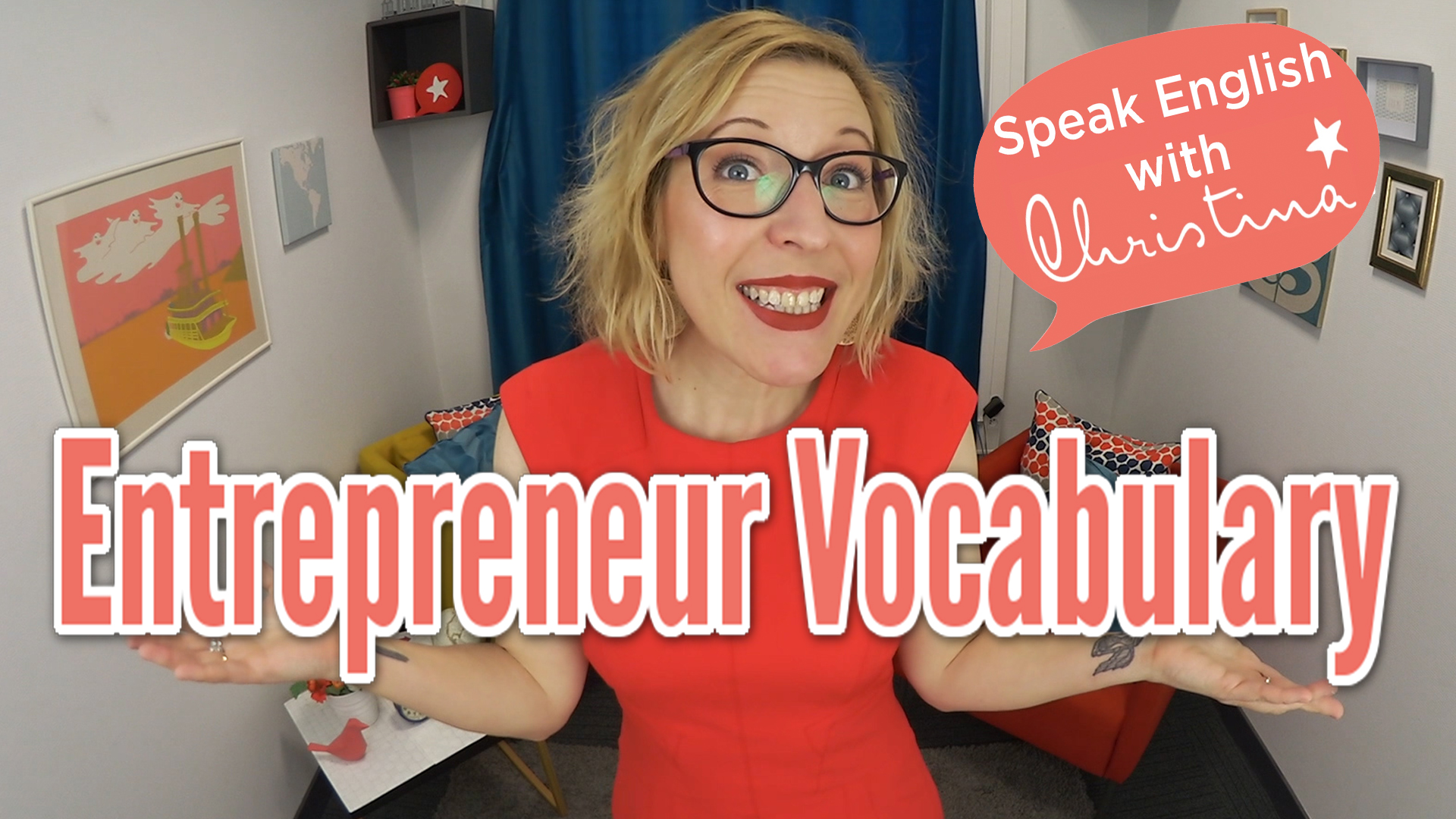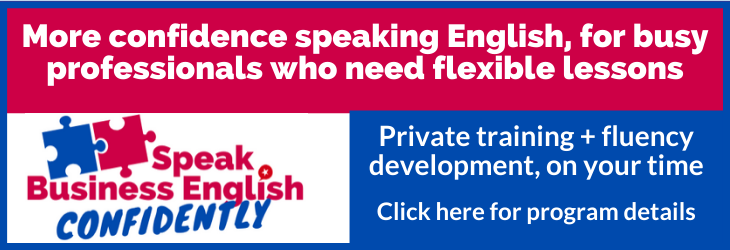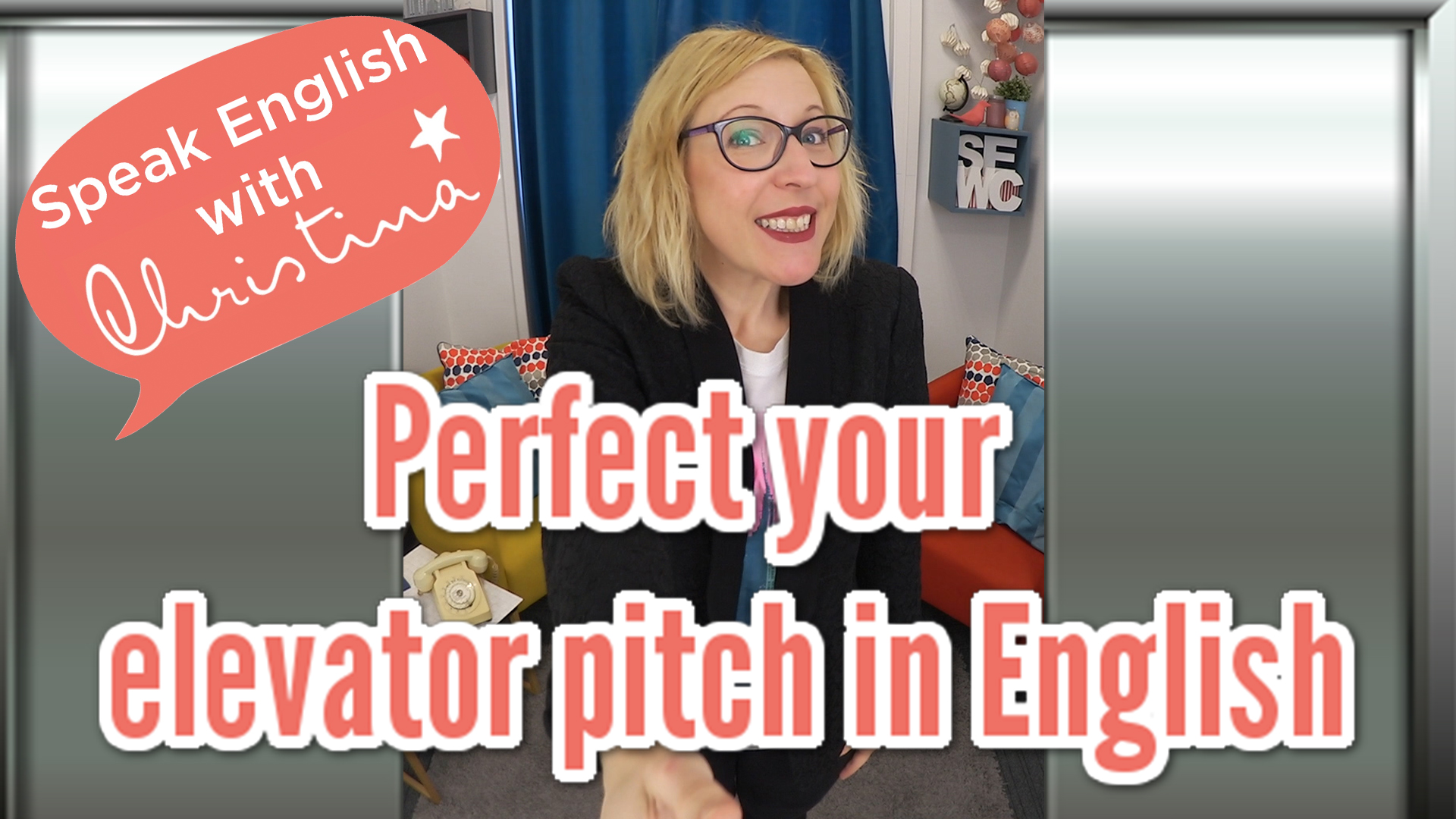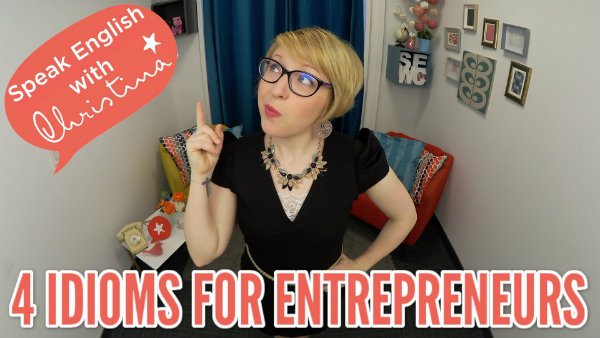
Let’s talk about entrepreneur vocabulary – how can you start your own business in English?
Hi there! I’m your English coach Christina, welcome to Speak English with Christina, where you’ll learn American culture and business know-how to become confident in English.
At conferences or business events, people will talk a lot about their company, their goals, their story. You can meet all the right people and get business insights that will help you boost your career.
And those are valuable opportunities, so you don’t want to get stuck on essential words that everybody uses, but that you don’t understand! I want to help you keep your credibility and reach your goals, and that starts with a review of some common vocabulary from the world of entrepreneurs. Let’s go!
Contents:
1. Basic situations for entrepreneurs
2. Specifics of online businesses
3. Your story
4. Bonus: Full list!
1. Basic situations for entrepreneurs
First, let’s define an entrepreneur. An entrepreneur is a person who starts their own business. Often, they’ll try to cater to a specific niche. A niche is a targeted segment of society. Entrepreneurs can offer both products and services.
They can lead their company (and not their enterprise, that word isn’t used this way in English!) on the road to being profitable. Profitable means they make more money than they spend. Sometimes, instead of focusing on profits, they can focus instead on growth: that means, they want to get bigger and bigger. When they grow their company, they’re able to serve or to help many more people from the start: their clients, their customers, the people who buy their solutions. What’s the difference? Technically speaking, clients buy services and customers buy products. But in reality, we use the two words interchangeably.
You can also find other, more casual idioms for entrepreneurs on the blog.
2. Specifics of online businesses
Of course, the vocabulary for entrepreneurs is often a bit stranger than this. And sometimes, you may wonder if the other person is speaking English, or some other strange language! Let’s look.
A business can help other businesses, in B2B, business-to-business.
Or maybe they sell directly to private clients, in B2C, business-to-consumer. For example, Speak English with Christina is both B2B and B2C. We work with both business and private clients.
If a business is selling software, do they sell their Software as a Product in SaaP, by letting clients download and use the program on their own? Or do they sell subscriptions to their software as a service in SaaS instead?
Is it a freemium, a product that’s free at first, but where you need to pay to upgrade to a better service? Or do they offer a trial period, where customers can use their software for free for a limited time, before they decide to buy or not?
You might also hear about strategies of content marketing or inbound marketing. This means that the company creates good content, like blog posts, podcasts, or videos, so that people find and visit the company’s website by themselves.
Once you have a business idea, you start building up your MVP. Now, in sports, this acronym means Most Valuable Player, but in business, we’re talking here about the Minimal Viable Product. It’s the least ambitious thing you can sell quickly, often with very few bells & whistles, or special features.
And the idea behind your MVP is to have proof of concept. That means that you prove that your concept attracts customers first, and then you can start improving it to make it even better!
When you start growing, it’s time to start thinking about scalability: does your business still work if it gets ten times more clients? Is everything going to fall apart once you try to get a hundred times more?
Can you scale your business, or do you need to stay small? And if all goes very well, you can even work a little magic! You enter the enchanted entrepreneurial forest as a unicorn: a tech company that’s worth over a billion dollars!
You can find more jargon (AND personal stories) in Great Women of Business, for instance – one of my favorite podcasts for advanced English!
3. Your story
When telling your own story, you’ll need to adapt it to your audience and your situation. Maybe you want to share how you finally found the job you always wanted?
Or how you got a lot of help from your mentor, someone with more experience who helped you overcome difficulties?
Or even, how you finally managed to get a big break, a short period of time with a lot of growth and success? People might want to hear about your achievement, the actual results you got from this adventure!
You can learn how to pitch your business in an English conversation – with scripts and strategy. Or perfect your elevator pitch in business English!
Another story you can tell is about your drive: your determination to get things done, and the reasons behind it.
Maybe you just want to solve problems for your customers. Maybe you want to add value to your clients, give them a solution that gives them the most bang for their buck. Or maybe you’re a bit more idealistic.
After all, starting your own business can be a way to make a difference. Tell us how you can make the world a better place !
And keep an eye out for the cultural differences in English, and with the American work culture!
4 – Bonus: The full vocabulary list
- An entrepreneur = someone who starts their own business
- A niche = a specific need / culture / audience for your business
- Products and services = what you sell
- A company = a business (don’t use “an entreprise”!)
- Profitable = making more money than you invest. Can take some time.
- Growth = becoming bigger, helping more people
- To serve = to help
- A client / a customer = someone who buys your products or services
- B2B = Business-to-business (your clients are businesses themselves)
- B2C = Business-to-customer (your products are for individual customers)
- SaaP = Software-as-a-product : you buy a software, you own it.
- SaaS = Software-as-a-service : you’re subscribed to a software
- Freemium = Software that can be used for free (or upgraded for a price)
- A trial period = A few days or weeks where you don’t need to pay to use a product
- Content marketing / Inbound marketing = Blog posts and free content (to get people on your site)
- MVP = Minimal Viable Product – The first product you can start selling fast.
- Proof of concept = Something to show your idea can work (with low risk / possible rewards)
- Scalability = Being able to handle success and growth:
= are you going to crash when you have 10 times more clients? - A unicorn = A horse with a horn / A tech company worth a billion dollars
- Your dream job = The job you always wanted
- Your mentor = Someone more experienced that helps you out
- Overcome difficulties = Succeeding despite some flaws
- To get a big break = The first big taste of success, when you get well-known
- Achievement = A goal you reached
- Your drive = Your passion for your company, the vision you have
- Solve problems = Helping people
- Add value = Making people happy
- The most bang for their buck = The best value/price ratio
- Make a difference = Making the world a better place
Now, tell me…
What’s your story? Tell us about you, your business, or what motivates you to get up in the morning to do a great job!
I LOVE stories like this, so please share in the comments below!
You just need to start typing, for instance, “My company is…” It’s a great way to practice your English!
And if you would like to become more fluent, more confident, and work with one of my Expert Teachers, check out my new program Speak Business English Confidently.
It combines private training sessions with regular conversation practice, so you speak more correct English, more fluidly.
To get more details, sign up to my email list! I’ll send you the details, plus lots of free bonuses to help you already speak business English more confidently.
Thanks so much for improving your English with me, and I’ll see you next time!
More good stuff...
Click the image to learn more








